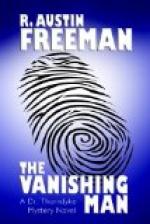“Time is running on, I fear,” said Mr. Jellicoe.
“It is, indeed,” Badger assented emphatically.
“Well, I need not detain you long,” said the lawyer. “My statement is a mere narration of events. But I desire to make it, and you, no doubt, will be interested to hear it.”
He opened the silver case and selected a fresh cigarette, which, however, he did not light. Inspector Badger produced a funereal notebook, which he laid open on his knee; and the rest of us settled ourselves in our chairs with no little curiosity to hear Mr. Jellicoe’s statement.
CHAPTER XX
THE END OF THE CASE
A profound silence had fallen on the room and its occupants. Mr. Jellicoe sat with his eyes fixed on the table as if deep in thought, the unlighted cigarette in one hand, the other grasping the tumbler of water. Presently Inspector Badger coughed impatiently and he looked up. “I beg your pardon, gentlemen,” he said. “I am keeping you waiting.”
He took a sip from the tumbler, opened a matchbox and took out a match, but apparently altering his mind, laid it down and commenced:
“The unfortunate affair which has brought you here to-night, had its origin ten years ago. At that time my friend Hurst became suddenly involved in financial difficulties—am I speaking too fast for you, Mr. Badger?”
“No, not at all,” replied Badger. “I am taking it down in shorthand.”
“Thank you,” said Mr. Jellicoe. “He became involved in serious difficulties and came to me for assistance. He wished to borrow five thousand pounds to enable him to meet his engagements. I had a certain amount of money at my disposal, but I did not consider Hurst’s security satisfactory; accordingly I felt compelled to refuse. But on the very next day, John Bellingham called on me with the draft of his will which he wished me to look over before it was executed.
“It was an absurd will, and I nearly told him so; but then an idea occurred to me in connection with Hurst. It was obvious to me, as soon as I had glanced through the will, that, if the burial clause was left as the testator had drafted it, Hurst had a very good chance of inheriting the property; and, as I was named as the executor, I should be able to give full effect to that clause. Accordingly, I asked for a few days to consider the will, and I then called upon Hurst and made a proposal to him; which was this: That I should advance him five thousand pounds without security; that I should ask for no repayment, but that he should assign to me any interest that he might have or acquire in the estate of John Bellingham up to ten thousand pounds, or two-thirds of any sum that he might inherit if over that amount. He asked if John had yet made any will, and I replied, quite correctly, that he had not. He inquired if I knew what testamentary arrangements John intended to make, and again I answered, quite correctly, that I believed that John proposed to devise the bulk of his property to his brother, Godfrey.




